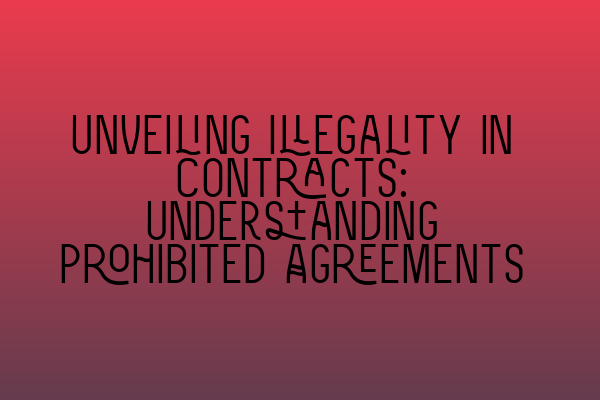Unveiling Illegality in Contracts: Understanding Prohibited Agreements
As a solicitor, it is crucial to have a deep understanding of contract law to ensure compliance and protect the interests of your clients. Contracts form the backbone of countless business transactions and personal agreements, setting out the rights and obligations of the parties involved. However, not all contracts are enforceable by law. Some agreements are deemed illegal, rendering them void and unenforceable. In this article, we will dive into the world of prohibited agreements, shedding light on their characteristics and legal implications.
What Is an Illegal Agreement?
An illegal agreement is one that involves activities or actions that are against the law, contravening statutory laws, public policy, and ethical norms. These agreements are considered void ab initio, meaning they are void from the beginning, and the law does not recognize their existence or enforce the parties’ obligations.
Illegal agreements can take various forms, including:
- Agreements to commit a crime: Any contract that promotes or facilitates criminal activities is illegal. For example, an agreement to engage in drug trafficking or money laundering would be considered illegal.
- Agreements that contravene public policy: Contracts that go against societal principles or public interest are deemed illegal. This can include agreements that promote discrimination, harm the environment, or violate human rights.
- Agreements in restraint of trade: Contracts that restrict competition or prevent free trade are generally unenforceable. This could include agreements that hinder an individual’s ability to work in a particular industry or region.
- Agreements without legal capacity: Contracts entered into by parties lacking legal capacity, such as minors or individuals with mental incapacity, may be considered illegal.
Implications of Illegality in Contracts
When a contract is deemed illegal, it not only loses its enforceability but also carries various legal consequences. These can include:
- Void and Unenforceable: An illegal agreement is void ab initio, meaning it is as if the contract never existed. The parties cannot enforce their rights or seek remedies under the contract.
- No Recovery: If one party has already performed their part of the illegal agreement, they cannot seek recovery or compensation for their actions. The law does not provide a remedy for parties involved in illegal activities.
- Criminal Liability: In some cases, engaging in an illegal agreement can lead to criminal charges. Parties involved may face fines, imprisonment, or other penalties imposed by the legal system.
- Taint on Legitimate Contracts: If an illegal agreement is to conceal or further an illegal purpose, any related legitimate contracts may also be affected. The court can refuse to enforce ancillary contracts connected to the illegal agreement.
Understanding the implications of illegality in contracts is essential to safeguarding the interests of your clients and ensuring compliance with the law. As a solicitor, it is crucial to exercise due diligence in reviewing and advising on contracts to prevent any involvement in illegal agreements.
Conclusion
Contracts are the foundation of legal relationships, providing a structured framework for individuals and businesses to conduct their affairs. However, not all agreements are created equal. Illegal agreements raise significant legal concerns and can have severe consequences for the parties involved. As a solicitor, it is your duty to thoroughly assess contracts and identify any potential illegality to protect your clients’ interests.
For more information on various aspects of the legal profession, check out our other articles:
- Barrister vs. Solicitor: A Comprehensive Comparison
- Exploring Different Solicitor Specializations: Finding Your Niche
- Embracing the Rise of Virtual Law Practices
- Navigating the Maze: Demystifying Ethical Responsibilities of Solicitors
- Unveiling Real-Life Case Studies: Insights into Legal Practice and Decision-Making
